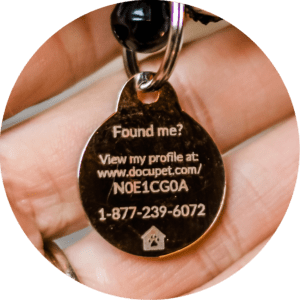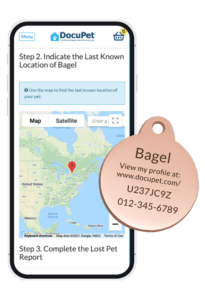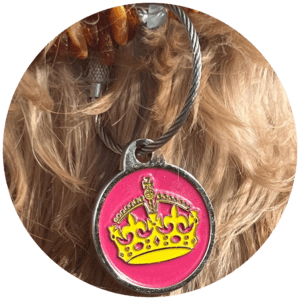A pet’s ID tag is their ticket home
Not only does a tag act as the first line of defence against a pet getting lost, but it’s also their most powerful advocate.
In a study conducted by the American Society for the Prevention of Cruelty to Animals (ASPCA), 80% of pet owners agreed that pet ID tags are important. Still, only 33% of these pet owners said their pets are tagged at all times (note: it’s recommended that pets not wear collars/tags while in a crate to avoid getting tangled or caught in the bars.)
So…just how important is that tag on your pet’s collar? Let’s jump into it ⬇️
Pet license and registration, please 👮♀️
 Along with serving as your pet’s primary form of identification, their tag is also an indicator that they hold a valid license, which means they are officially recognized as a (furry) member of the community. In some areas, a license tag may also serve as proof that your pet has been vaccinated against rabies.
Along with serving as your pet’s primary form of identification, their tag is also an indicator that they hold a valid license, which means they are officially recognized as a (furry) member of the community. In some areas, a license tag may also serve as proof that your pet has been vaccinated against rabies.
Your pet’s ID tag broadcasts a message to the public that is loud, clear and hard to miss: “I HAVE A FAMILY!” If someone finds your furry pal, they immediately know they are on the loose. In a few moments, they can quickly check your pet’s tag, see the phone number on the back (this could be your personal number or our HomeSafe™ hotline) and know they need to make a call in order to get that cutie back home.
The lost pet service that doesn’t sleep
A phone number on the back of a pet’s tag is uber important, but why stop there? We’ve taken the traditional pet tag and pumped it full of features that will help any lost pet get properly identified, cared for, and returned home.
Every single DocuPet tag comes with our free HomeSafe™ 24/7 lost pet service built-in. Powered by a dedicated dispatch team and a community-wide network of pet owners, this free service has reunited thousands of lost pets with their families.

Your pet’s tag is equipped with a unique 8-digit code etched on the back of their tag. Not only is this code used to report your pet as found to our HomeSafe™ team, but when searched on our website, it also directs to your pet’s public-facing profile. Here, you can include information about your pet that would be important for anyone who finds them: contact information, Pet Guardians, medical details, care instructions, and even your pet’s feeding schedule can be shown here. Make all of your pet’s most important information readily available at your discretion: you control what information is public versus private through your account settings.
Pro tip: Want an extra layer of security for your pet? Opt to engrave your pet’s DocuPet collar buckle to include their HomeSafe™ code and phone number.
“But my pet is microchipped!”

We hear you barking, big dog. Microchips can serve an important purpose in pet reunification efforts but unfortunately shouldn’t be relied upon as the sole means of protection for a pet. When it comes to protecting your pet, the more identification, the better! Together with license tags, microchipping is a great safeguard to have on your pet’s side. However, a microchip’s effectiveness hinges on a few factors-
- A person who finds a pet has to know to take them to a vet or shelter to get scanned
- Microchips may shift under your pet’s skin with time and become unscannable
- Sometimes, scanners aren’t compatible with certain microchips
- The name and contact information linked to the microchip must be current and correct
So with all that, we say “if you love ‘em, tag ‘em!”
Now would be a great time to make sure you and your pet’s information is up to date 📝 To learn more about our HomeSafe™ 24/7 lost pet service, click here.


